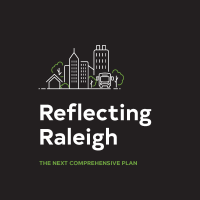Reflecting Raleigh: Infrastructure & Services
Reflecting Raleigh: Infrastructure & Services
The Comprehensive Plan is a long-range policy document that outlines a vision for how Raleigh will look and feel in the future, and how the city should grow to achieve that vision. This plan will take about 2.5 years to create and will provide policy guidance through the year 2050. We are spending the first year of the planning process collecting ideas from you to determine what we should focus on in the future. Feedback you provide on this survey will help shape the vision and goals of Raleigh’s Next Comprehensive Plan.
As Raleigh’s population continues to grow, the need for providing necessary services and maintaining our infrastructure will play a key role in providing a good quality of life for all Raleigh residents. This survey will help us understand your priorities and how you think we should plan for the future.
Some words have a specific meaning in the context of city planning. If you're not sure exactly what we mean, check out our key terms glossary.
